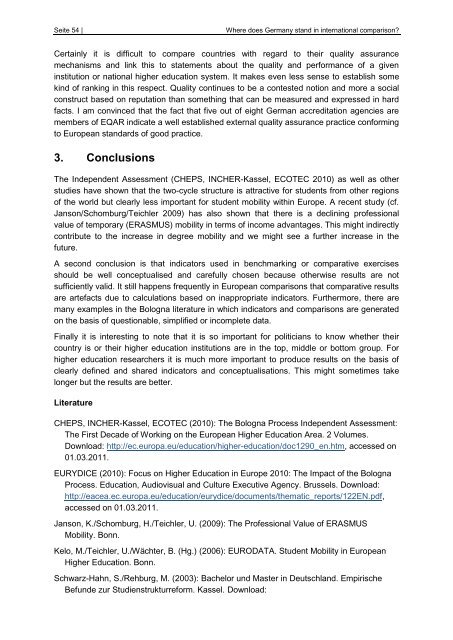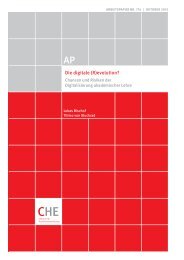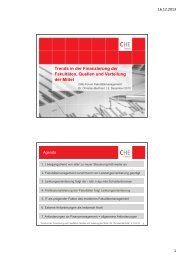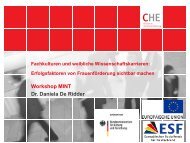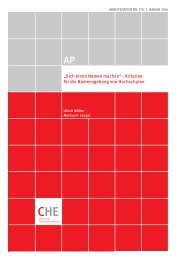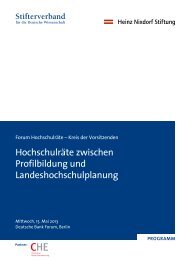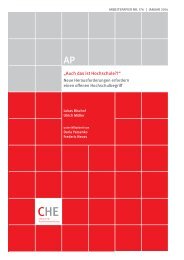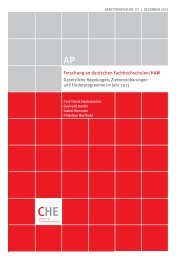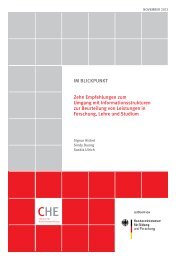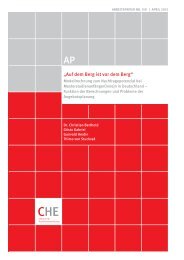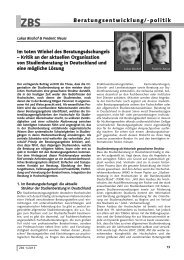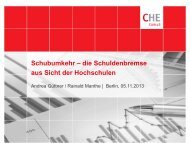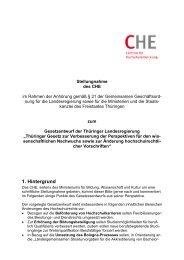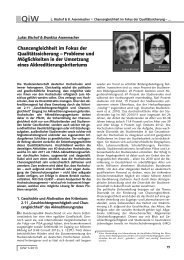Der Bologna-Prozess aus Sicht der Hochschulforschung
Der Bologna-Prozess aus Sicht der Hochschulforschung
Der Bologna-Prozess aus Sicht der Hochschulforschung
Erfolgreiche ePaper selbst erstellen
Machen Sie aus Ihren PDF Publikationen ein blätterbares Flipbook mit unserer einzigartigen Google optimierten e-Paper Software.
Seite 54 | Where does Germany stand in international comparison?<br />
Certainly it is difficult to compare countries with regard to their quality assurance<br />
mechanisms and link this to statements about the quality and performance of a given<br />
institution or national higher education system. It makes even less sense to establish some<br />
kind of ranking in this respect. Quality continues to be a contested notion and more a social<br />
construct based on reputation than something that can be measured and expressed in hard<br />
facts. I am convinced that the fact that five out of eight German accreditation agencies are<br />
members of EQAR indicate a well established external quality assurance practice conforming<br />
to European standards of good practice.<br />
3. Conclusions<br />
The Independent Assessment (CHEPS, INCHER-Kassel, ECOTEC 2010) as well as other<br />
studies have shown that the two-cycle structure is attractive for students from other regions<br />
of the world but clearly less important for student mobility within Europe. A recent study (cf.<br />
Janson/Schomburg/Teichler 2009) has also shown that there is a declining professional<br />
value of temporary (ERASMUS) mobility in terms of income advantages. This might indirectly<br />
contribute to the increase in degree mobility and we might see a further increase in the<br />
future.<br />
A second conclusion is that indicators used in benchmarking or comparative exercises<br />
should be well conceptualised and carefully chosen bec<strong>aus</strong>e otherwise results are not<br />
sufficiently valid. It still happens frequently in European comparisons that comparative results<br />
are artefacts due to calculations based on inappropriate indicators. Furthermore, there are<br />
many examples in the <strong>Bologna</strong> literature in which indicators and comparisons are generated<br />
on the basis of questionable, simplified or incomplete data.<br />
Finally it is interesting to note that it is so important for politicians to know whether their<br />
country is or their higher education institutions are in the top, middle or bottom group. For<br />
higher education researchers it is much more important to produce results on the basis of<br />
clearly defined and shared indicators and conceptualisations. This might sometimes take<br />
longer but the results are better.<br />
Literature<br />
CHEPS, INCHER-Kassel, ECOTEC (2010): The <strong>Bologna</strong> Process Independent Assessment:<br />
The First Decade of Working on the European Higher Education Area. 2 Volumes.<br />
Download: http://ec.europa.eu/education/higher-education/doc1290_en.htm, accessed on<br />
01.03.2011.<br />
EURYDICE (2010): Focus on Higher Education in Europe 2010: The Impact of the <strong>Bologna</strong><br />
Process. Education, Audiovisual and Culture Executive Agency. Brussels. Download:<br />
http://eacea.ec.europa.eu/education/eurydice/documents/thematic_reports/122EN.pdf,<br />
accessed on 01.03.2011.<br />
Janson, K./Schomburg, H./Teichler, U. (2009): The Professional Value of ERASMUS<br />
Mobility. Bonn.<br />
Kelo, M./Teichler, U./Wächter, B. (Hg.) (2006): EURODATA. Student Mobility in European<br />
Higher Education. Bonn.<br />
Schwarz-Hahn, S./Rehburg, M. (2003): Bachelor und Master in Deutschland. Empirische<br />
Befunde zur Studienstrukturreform. Kassel. Download:


